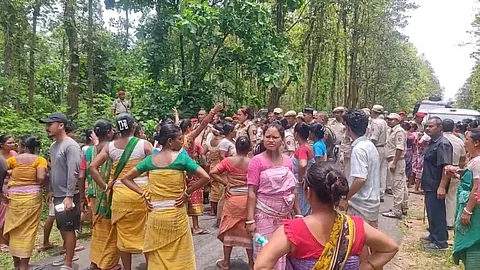
- Home
- Live Blog
- Breaking News
- Top Headlines
- Cities
- NE News
- Sentinel Media
- Sports
- Education
- Jobs

OUR CORRESPONDENT
KOKRAJHAR: The Bodo National Students Union (BONSU) strongly opposed the Assam Government and Bodoland Territorial Council’s (BTC) decision to allocate 3,600 bighas of tribal land in Bashbari, Kokrajhar, to the Adani Group for setting up of a thermal power plant.
In a press meet held at Kokrajhar Press Club on Saturday, BONSU President Bonjit Manjil Basumatary said that the decision was taken without free, prior, and informed consent of the indigenous Bodo and other tribal communities for the proposed thermal power plants, and is a direct violation of the constitutional and international protections for indigenous rights.
He said that the land in question fell within the Bodoland Territorial Region (BTR), governed by the sixth schedule of the Indian Constitution, which reserves land for indigenous tribal communities and prohibits transfer to non-tribals or corporations without community consent, where the Assam Land and Revenue Regulation Act, 1886, and BTC Accord, 2003, guaranteed protection of tribal belts and blocks, mandating that such land cannot be transferred to outsiders or used for commercial projects without the approval of the autonomous council and affected communities.
Basumatary said that the United Nations Declaration on the Rights of Indigenous People (UNDRIP) required a free, prior, and informed consent before any development on indigenous land and that the current move blatantly disregarded these international obligations. He also said that across India and abroad, Adani’s projects had repeatedly dispossessed indigenous people, destroyed sacred sites, and led to forced evictions, examples including the Godda Coal Power Station in Jharkhand and the Carmichael mine in Australia, both marked by coercion, lack of consent, and severe human rights abuses. Basumatary added that the Adani’s so-called educational initiatives for tribal children had been criticized as attempts at cultural erasure, undermining indigenous identity rather than empowering communities.
The BONSU President said that promises on jobs and rehabilitation of displaced indigenous people have consistently gone unfulfilled. In Godda, Jharkhand, and other sites, those who lost lands received neither adequate compensation nor secure employment, with many left landless and impoverished, he said, adding that in Assam, there was no transparent plan for local hiring or meaningful rehabilitation for those who would be uprooted by the project.
The student body said that the proposed power plant site has over 5 lakh sal and teak trees and lies within a vital forest area. It pointed out that its destruction will devastate local ecology, water sources, and air quality, directly impacting the health and livelihoods of indigenous communities. It added that thermal power plants are notorious for air and water pollution, leading to respiratory diseases, contaminated water, and long-term health crises for nearby populations.
Also Read: Assam: Adani inspects site for power plant at Basbari in Kokrajhar district
Also Watch: